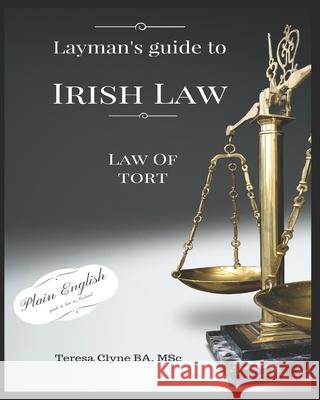Layman's Guide to Irish Law: The Law of Tort » książka
Layman's Guide to Irish Law: The Law of Tort
ISBN-13: 9781530010226 / Angielski / Miękka / 2016 / 148 str.
The Law of Tort A tort is a civil wrong, tort is a French word for wrong, or the Latin word 'tortum or twisted," a tort occurs when a person commits a civil wrong against another person causing them damage. Tortfeasor is the person who commits the tort. Under tort law, an injured party can bring a civil case to seek compensation for a wrong done to the party or the party's property. Simply put; the law of tort is a branch of law which helps people to make a claim for compensation (usually a money payment) from another person who hurts them or their property. For instance, when one driver hurts another driver because he or she was not paying attention (negligent), the driver who caused the hurt (defendant) may have committed a tort. If a person (plaintiff) is hurt by another person (defendant) they may be able to sue them (civil litigation) and get compensation (usually money). Most torts are accidents, like car accidents or slippery floors where people can fall down and get hurt. But some torts are done on purpose. These are called intentional torts. For example, if one person punches another person, this could be an intentional tort called battery. Introduction2 The Law of Tort4 Tort9 What is the law of tort all about?10 Intentional Torts11 Unintentional Torts12 Strict Liability Torts13 Intentional Torts14 Trespass to the person14 Assault15 Threats16 Silent phone calls16 Battery17 False Imprisonment17 Trespass torts in medicine18 Defences to the tort of trespass18 Consent18 Self-defence19 Defence of Third Persons19 Lawful Authority20 Defence of Property21 Duress (pressure or threat)21 Trespass to Land21 Trespass to Goods24 Conversion24 Sample conversion25 Remedies25 Nuisance27 Locus Standi28 Omissions28 Damage or Interference30 The types of damages are as follows:30 Material Damage30 Interference with enjoyment30 Magnitude of harm31 Nature of locality31 Defendant's motives31 Social utility31 Public Nuisance:32 Pure Economic Loss33 Remedies34 Damages34 Injunctions34 Defences35 Private Rented Tenants:35 Landlords must enforce these tenant obligations:35 Local Authority Tenants:35 Private Home-Owner:36 Alarms36 Unintentional Torts38 Negligence38 Duty of Care39 Historical development42 Irish development in duty of care43 Contributory Negligence44 The Standard of Care45 Breach (of the duty of care)46 Foreseeability and Policy Factors46 Causation47 Causes-in-fact47 The "but for" Test48 Novus Actus Interveniens48 Material Contribution test49 Bolitho Test49 Fairchild50 Remoteness51 "Cause in law"51 The "thin skull" rule.52 Professional Negligence54 Strict Liability Torts56 The Occupiers Liability Act 199556 Vicarious Liability58 Employers Liability60 Liability for Defective Products61 Defamation63 Balance of rights64 Defamation Cases in Ireland67 Identification68 Privilege69 Qualified Privilege69 Blasphemy70 Defamation Act 201070 Remedies71 Damages71 General Damages.71 Special Damages72 Aggravated Damages72 Punitive Damages72 Win or lose?72 Defences73 Defence of 'Truth'73 Defamation in the Information age76 ISP Service Providers76 Strict Liability and Rylands v. Fletcher79 Facts of the case80 The principles laid out in Rylands v Fletcher 1868]82 Defences:84 Act of a Stranger84 Volenti (willingly)84 Statutory Authority85 Default of the claimant85 Act of God85 Recommended Reading87 About the Author:88 Bibliography89
Zawartość książki może nie spełniać oczekiwań – reklamacje nie obejmują treści, która mogła nie być redakcyjnie ani merytorycznie opracowana.











